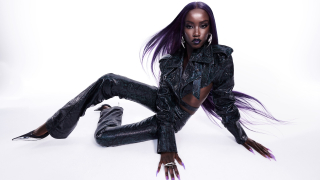Black History Month is usually a time of reflection. But for Black athletes, it needs to be that spark they need to re-ignite those all-important and uncomfortable but necessary conversations we need to have on hot-button topics such as voting rights, racism and the education of American children
When it comes to Black History Month and sports, there’s this “rinse, recycle, repeat” feel about it.
Every year around this time, we are reminded of the sacrifices made by Tommie Smith and John Carlos at the 1968 Olympics as they stood, heads bowed and black-gloved fists raised high, on the winner’s podium.
Track and field legend Jesse Owens and his athletic brilliance in the face of racism both abroad and at home in the United States, becomes a common talking point this month.
EBONY's November 2021 digital cover star Colin Kaepernick and the stance he took that cut short what was an impressive NFL career to highlight police brutality towards Blacks and other inequalities involving people of color, becomes amplified this month, too.
And then there was Muhammad Ali, vilified at the time for not wanting to fight in the Vietnam War, but later was viewed by many as a hero because of the stance he took.
These are all feel-good memories that most folks, Black and white alike, can get behind easily.
They are comfortable conversations, like your favorite fuzzy slippers or that choice late-night snack.
But for Black athletes, this month needs to serve a greater purpose.
It needs to be that spark they use to re-ignite those necessary but important uncomfortable conversations that need to be had on issues such as voting rights, racism and the education of children in this country.
Black excellence in sports has in many ways given way to acceptance that the way things are now when it comes to social justice or economics or laws of the land as they relate to Black people and other POCs (People of Color), is just how it is.
My biggest concern following George Floyd’s killing more than a year ago, had nothing to do with the energy and attention his death would bring to social justice reform across the country.
That was a given.
I was more concerned with the sustainability of that energy displayed by athletes across the world, when they went back to doing their best to resume their pre-pandemic lives.
Athletes were united on several fronts to get the word out about the importance of voting in the 2020 presidential election as well as some key senatorial races.
But we have midterm elections coming up soon with several pieces of legislation that have the potential to significantly impact the ability to vote. There’s legislation in multiple school districts across the country that are looking to white-wash history by pretending as if some of the sordid but very real truths of our nation’s emergence into a global power, never happened.
The energy and outspoken nature that we saw come from some of sports biggest figures, isn’t around anymore.
And rockin’ socially conscious T-shirts on Zoom calls, doesn’t count.
That is why the history of Black athletes, something that’s part of our Black history celebration this month, has to be more than just a time to reflect.
Those memories and pivotal moments of the past, have to be seen as a blueprint for what’s on the horizon—or at least, a path that moves us closer in that direction.
Athletes are still engaged in the struggle, but the uncomfortable truths that so many were bringing to the forefront as talking points a year ago, have become comfortable non-conversations still happening in private but seem to have lost their appeal to be front-and-center discussion.
It’s well documented that the attention span of our society today is shorter than it was five or ten years ago.
This is why it’s important that Black athletes rediscover that energy for change that so many seemed to have a year ago.
Because as we sort through all the changes that this country has embraced in recent years, the last thing Black athletes need to do is grow increasingly comfortable with being comfortable.
When you see the attacks legislatively on voting rights, the economic disparity that’s showing little to no signs of improving for people of color, and the outspoken voices of athletes becoming quieter compared to where they were a couple of years ago, this is not the time for Black athletes to be comfortable.
If anything, the times we are in now will in time show who was in the struggle to bring about change, and who was along for the ride because it helped their social media clout.
Boston Celtics guard Jaylen Brown has been one of the more outspoken athletes when it comes to bringing about social justice change.
He has used his platform to march the streets of Atlanta in protest following George Floyd’s death, and last month spoke truth to power when he addressed a predominantly white fan base at Boston’s TD Garden, prior to a game being played on Martin Luther King Jr. Day.
“Systemic racism is real,” Brown said at the time. “It plagues the city of Boston as well as the rest of our society. Thank you to Dr. Martin Luther King and others, who sacrificed...for the cause we all believe in. Rest assured, the fight continues.”












